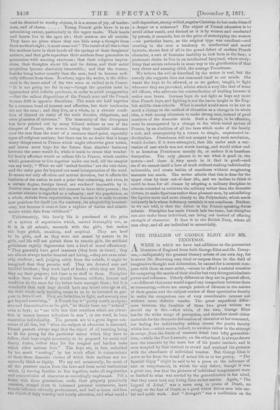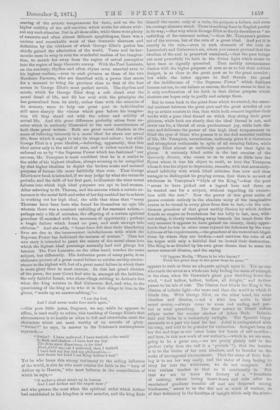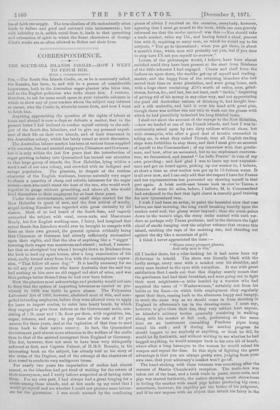TIIE IDEALISM OF GEORGE ELIOT AND MR. TENNYSON.
A WEEK in which we have had additions to the permanent literature of England from both George Eliot and Mr. Tenny- Kati—indisputably the greatest literary artists of our own day, for however Mr. Browning may rival or surpass them in the field of imaginative thought and delineation, Ile cannot for a moment com- pare with them as mere artist,—seetns to afford a natural occasion for comparing the merits of their similar but very divergent idealistic power and influence. Utterly different as they are in general effect, —so different that some would regard any comparison between them as onmeauing,—there are enough points of likeness in the nature of their genius and the subject-matter of their speculative faculty to make the comparison one of very considerable interest not without some definite results, The great superficial differ- ence between the faculties of these two great writers we should say is this,—that while, of the two, George Eliot has far the wider range of perception, and therefore much richer materials for the dramatic delineation of character at her command, her feeling for individuality seldom rouses the poetic faculty within her,—which seems, indeed, to awaken rather in the attempt to escape .front the limits of concrete detail into lofty generalizetion,—while the Poet Laureate, on the other hand, is always drawn
into the concrete by the mere law of his poetic instinct, and is even tempted by that instinct to crowd and overload his pictures with the abundance of individual touches. But George Eliot is never so far from the detail of actual life as in her poetry. "The Spanish Gipsy" might be said to be a poem on the influence of race on temperament, in which the only defect, though it was a great one, was that the pictures of individual temperament were so limited to what was needed by the generalization in her mind, that they never took any living form on her canvas. Again, "The Legend of Jabal," was a mere song in praise of Death, an eulogy on the fear of Death as a good which drives men into use-
craving of the artistic temperament for fame, and on the far higher nobility of the self-sacrifice which works for others with- out any. such stimulus. But in all these alike, while there were plenty of sonorous and often almost Miltonic apophthegms, there was a curious and remarkable want of that dramatic clearness and definition by the vividness of which George Eliot's genius has chiefly gained the admiration of the world. Verse and its har- monies seem to wrap in mist the wonderful realism of her imagina- tion, to snatch her away from the region of actual perception into the region of largo theoretic survey. With the Poet Laureate, on the contrary, rhythm and often rhyme seem essential even to his highest realism,—even to such pictures as those of the two Northern Farmers, who are described with a power that seems for a moment to bring his province close to that of the best scenes in George Eliot's most perfect novels. The rhythm and music, which for George Eliot drop a soft cloud over the moral detail of life, and fill her soul with the principles she has generalized from its study, rather than with the minutite of it scenery, scorn to help our great poet to individualize still more sharply the visions which pass before his imagina- tion till they stand out with the colour and solidity of actual life. And this great difference probably arises from an- other which is curiously illustrated in the new contributions of both these great writers. Both are great moral idealists in the sense of believing intensely in a moral ideal far above our actual life, from which it ought to take its shape and colour ; but while George Eliot is a pure idealist,—believing, apparently, that this ideal exists only in the mind of man, and is rather mocked than enforced on us by "the Supreme Power which has fashioned" our natures, Mr. Tennyson is most confident that he is a realist in the midst of his highest idealism, always seeming to be compelled by that higher idealism to depict the broken music and maimed purposes of human life more faithfully than ever. Thus George Eliot's new book is intended, if we may judge by what she terms its prelude, and the drift of her first part, to illustrate the utter moral failures into which high ideal purposes are apt to lead women. After referring to St. Theresa, and the success which a certain co- herence in the social faith and order of her day enabled her to achieve in working out her high ideal, she adds that since then "many Theresas have been born who found for themselves no epic life wherein there was a constant unfolding of far-resonant action,— perhaps only a life of mistakes, the offspring of a certain spiritual grandeur ill-niatcked with the meanness of opportunity ; perhaps a tragic failure which found. no poet, and sank unwept into oblivion." And she adds, " Some have felt that their blundering lives are due to the inconvenient indefiniteness with which the Supreme Power has fashioned the natures of women," Thus her new story is intended to paint the misery of the moral chaos into which the highest ideal yearnings naturally lead and plunge her heroine. The Poet Laureate, on the other hand, touches the same subject, but differently. His Arthurian poem of many parts, is an elaborate picture of a great moral failure to subdue earthly circum- stance to the highest will, but of a great moral failure in which there is more glory than in most success. In this last grand division of the poem, the poor Court fool who is, amongst all the faithless, the only faithful found, who alone clings sobbing to Arthur's feet when the king returns to find Guinevere fled, and who, to the questioning of the king as to who it is that clings to him in the gloom, "sends up an answer sobbing,"—
" I am thy fool, And I shall never make thee smile again," —this poor little jester, Dagonet, we say, while he appears to affirm, is used really to refute, this teaching of George Eliot's that circumstance is so hostile as often to foil and overwhelm most the characters which are most worthy of an aureole of glory.
"Swine ?" he says, in answer to Sir Tristram's contemptuous reproach,— "Swine? I have wallowed, I have washed,—the world Is flesh and shadow—I have had my day.
The dirty nurse Esperienee, in liar kind Bath fout'd ?ne,—se I wallowed, then I washed.
I bare hail my day and my philosophios,-- And thank the Lord I am King Arthur's fool."
Yet he who bears this strong testimony to the soiling influence of the world, is also he who most retains the faith in the " harp of Arthur up in Heaven," who most believes in the constellation of which he says,—
" It makes a silent musics up in heaven And I and Arthur and the angels hear ;"
and who grieves the most when the spiritual order which Arthur had established in his kingdom is rent asunder, and the king finds
himself the centre only of a ruin, his purpose a failure, and even his courage almost a wreck. There is nothing finer in English poetry in its way,—that way which George Eliot so finely- describes as " an unfolding of far-resonant action,"—than Mr. Tennyson's picture not of the success, but of the ruin of a great ideal. And yet it is exactly in the ruin,—even in such elements of the ruin as Launcelot's and Guinevere's sin, where you cannot pretend that the idealism of the soul is preserved unstained,—that the poet brings out most powerfully his faith in the divine light which seems to have been so signally quenched. That earthly circumstance clashes with the higher purposes of men so as to foil their noblest designs, is as clear to the great poet as to the great novelist ; but while the latter appears to find therein the proof of the indifference of "the Supreme Power" which fashions
• human nature, to our failure or success, the former seems to find ili- a only confirmation of his faith in that divine purpose which shatters our hopes only to purify and enlarge them.
But to come back to the point from which we started, the essen- tial contrast between the great pbet and the great novelist of our day as artists consists in this, that while both connect together their works with a pure ideal thread on which they string their great pictures, while both see clearly that the ideal thread is not, and never can be, a thread of even predominant joy, while both dis- cern and delineate the power of this high ideal temperament to blind the eyes of those who possess it to the dull material realities of life, Mr. Tennyson, nevertheless, uniformly gives it a victorious. and triumphant euthanasia in spite of all seeming failure, while George Eliot almost as uniformly quenches her ideal light in gloom. A curiously blind critic in the last number of the Quarterly Review, who seems to us to enter as little into the Byron whom it was his object to exalt, as into the Tennyson whom it was his object to depreciate, remarks, with that accurately- aimed infelicity with which blind criticism doos now and then manages to distinguish its groping course, that there is no sort of wholeness in Tennyeon's "idyls of the King,"—that the poet "seems to have picked out a legend here and there as he wanted one for a subject, without regarding its connec- tion with the rest." Now the power of this great series of poems consists entirely in the absolute unity of the imaginative centre to be traced in every piece from first to last,—in the con- tinuous grandeur of that great earthly illusion by which Arthur founds an empire on foundations far too lofty to last, sees, with- out seeing, it slowly crumbling away beneath his touch from the very moment it appears to have gained its victory, dimly appre- hends that he has in some sense injured his followers by the vary loftiness of his requirements, —the grandeur of the vows which blight those by whom they are broken,—and survives the ruin of all his hopes with only a faithful fool to bewail their destruction. The King is so blinded by his own great dream that to some his career seems all illusion, and the saying
"Of bygone Merlin, Where is he who knows? From the groat deep to the great deep ho goes,' " appears to such as these an adequate epitaph upon it. Yet no one who reads the series as a whole can help feeling the sense of triumph in the close, when Sir Ga.waine's ghost goes shrieking down the wind, " And hollow, hollow, hollow, all delight," awl Arthar passes to his isle of rest. The illusion that blinds the King is the illusion of infinite light—far more real than the world to which it blinds him. With George Eliot, on the other hand, the same.
idealism and illusion, — not a whit he noble in their moral source, —always come to some sad ending and par- tial or total quenching. l'he finer nature in Dinah suffers' eclipse under the secular shadow of Adam Bede. RoMola fails and fades in a melancholy twilight. The Spanish Gipsy succumbs to a part too hard for her. Jabal is extinguished with his song, and told to be grateful for extinction. Armgart loses all her fire and hope as she takes home her lesson of self-sacrifice ; and here, in this new work of our author's,—which is, we are sure, going to be a great one,—we are pretty plainly told in the preface (why does she call it a prelude ' ?), that the heroine is to be the victim of her own idealism, and to founder on the rocks of uncongenial circumstance. That the sister of little feel- ing is to seo her way easily, and the sister of deep feeling to
stray far into the wilderness, we do not complain. All true realism teaches us that so it continually is. Butt that we are to trace the history of a " foundress- of nothing, whose loving heart-beats and sobs after an unattained goodness tremble off and are dispersed among hindrances," seems to us the fiat not so much of realism, as- of that deficiency in the faculties of insight which only the stimn-
lus of faith can supply. The true idealism of life undoubtedly often leads to failure and grief and outward ruin immeasurable ; but only infidelity to it, selfish recoil from it, leads to that quenching and exhaustion of spirit in which the finest characters of George Eliot's works are so often allowed to flicker out their lives.




































 Previous page
Previous page